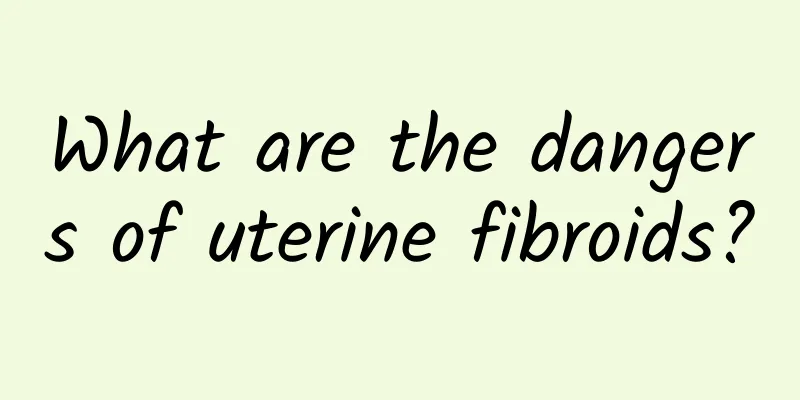What are the dangers of uterine fibroids?

|
Uterine fibroids may cause menstrual abnormalities, infertility, compression of surrounding organs, and other hazards. Severe cases require medical treatment with medication or surgery. Early detection and targeted intervention measures are key. 1. Abnormal menstruation Uterine fibroids may cause menstrual cycle disorders, such as increased menstrual flow, prolonged menstruation, or intermittent vaginal bleeding. This is because fibroids may affect the normal exfoliation of the endometrium and blood flow. If menstruation is excessive for a long time, the patient is prone to develop anemia, which manifests as pale complexion, fatigue, dizziness and other symptoms. It is recommended to pay attention to menstrual changes, take iron supplements to improve anemia if necessary, and seek medical attention in time to determine the size and location of the fibroids. 2Infertility and pregnancy related issues Uterine fibroids may affect women's fertility, especially submucosal fibroids located in the uterine cavity. It may hinder the implantation of fertilized eggs or cause pregnancy miscarriage. In addition, large fibroids may squeeze the uterus, cause cervical obstruction or uterine cavity deformation, which will also reduce the success rate of pregnancy. For people who want to have children, it is recommended to consider minimally invasive surgery such as hysteroscopy to remove fibroids to improve fertility conditions based on the doctor's evaluation. 3Compression of surrounding organs causes symptoms Larger uterine fibroids can compress surrounding organs, which may cause frequent urination, dysuria, constipation, or persistent pain in the lower abdomen. This compression symptom is particularly noticeable when the fibroids grow over a long period of time or when the uterus as a whole enlarges. Ultrasound can be used to check the size and location of the fibroids, and conservative treatment such as medication to shrink the fibroids or surgical removal such as laparoscopic surgery can be used if necessary. 4 Potential risk of malignant transformation Most uterine fibroids are benign tumors, but long-term untreated fibroids may deteriorate into sarcomas in rare cases. However, the chance of malignant transformation is less than 1%. If fibroids grow rapidly or cause irregular pain after childbirth, special attention should be paid and the patient should be promptly examined for risks. The harm of uterine fibroids cannot be ignored, but early detection and early treatment can effectively control its development. If abnormal symptoms are found, B-ultrasound screening should be performed as soon as possible, and reasonable intervention methods should be selected according to the doctor's advice. Maintaining good living habits and regular gynecological examinations are also important means to prevent related complications. |
<<: Why does dysmenorrhea cause stomach discomfort?
>>: Causes and symptoms of uterine cysts
Recommend
Can sweet potatoes and brown rice prevent cancer? It may not be a panacea! Hou Wenyi nutritionist: It is better to eat it with white rice
Modern people are under great stress, often eat o...
Create a lean physique like this! 5 stretching exercises to help you learn how to tighten your vagina and get a perfect curve
Yumico stretching for vaginal tightening exercise...
How to treat third degree cervical erosion during pregnancy
Female friends must pay attention to health care ...
Is uterine fibroid biopsy malignant?
Is uterine fibroid biopsy malignant? 1. Uterine f...
Diet for multiple uterine fibroids
Diet for multiple uterine fibroids: Foods that ca...
There is a reason why it is easy to gain weight! To boost your metabolism, drink the right coffee, chocolate and this soup.
"Foods that increase basal metabolism" ...
Is scraping good for pelvic inflammatory disease? Yes, it helps.
Gua Sha is a physiotherapy method that many women...
What should I do if my ovarian cyst is about 4 cm?
What should I do if my ovarian cyst is about 4 cm...
Know the symptoms of bacterial vaginosis
Bacterial vaginosis is a common gynecological dis...
What are the clinical manifestations of cervical erosion?
If you have cervical erosion, you should actively...
Where can I get massage to treat irregular menstruation?
Menstrual disorders are also called irregular men...
What should I do if I have endometrial tuberculosis?
Many friends do not pay attention in their daily ...
What are the treatments for habitual miscarriage?
Some women have weak constitutions or have had to...
Causes of irregular menstruation
Irregular menstruation is a manifestation of the ...
Oil Myths! Good fats are good for your health and don’t make you fat
You know it's true, every woman I know needs ...









